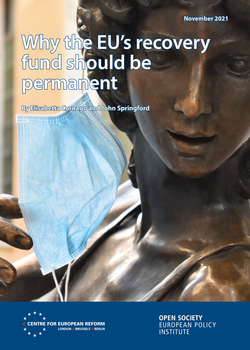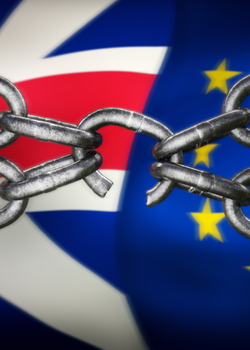Britain & EU member-states
A permanent EU recovery fund can help Poland change
29 November 2021
The EU’s climate ambitions will add tension to its relationship with Poland. Making the EU’s recovery fund permanent would provide stronger incentives for Poland to embrace the energy transition.
The three deaths of EU-UK data adequacy
15 November 2021
European and British businesses can still freely transfer personal data between the EU and UK. This situation has spared both sides disruption – but is unlikely to last.
Why the EU's recovery fund should be permanent: Country report - France
11 November 2021
[NAVIGATION]
COVID-19France has had one of the highest rates of COVID-19 cases and deaths in the EU, after three large waves in March and October 2020, and in the spring of 2021. Like most European countries, France provided a ‘chômage partiel’ furlough scheme for workers in businesses that were forced to...
COVID-19France has had one of the highest rates of COVID-19 cases and deaths in the EU, after three large waves in March and October 2020, and in the spring of 2021. Like most European countries, France provided a ‘chômage partiel’ furlough scheme for workers in businesses that were forced to...
Why the EU's recovery fund should be permanent: Country report - Germany
11 November 2021
[NAVIGATION]
COVID-19Germany locked down at an early stage of the first wave in March 2020, which meant that it suffered fewer hospitalisations and deaths than most other countries in Western Europe. Deaths in the autumn and winter waves of the disease were lower than its peers, too. Its fiscal response to...
COVID-19Germany locked down at an early stage of the first wave in March 2020, which meant that it suffered fewer hospitalisations and deaths than most other countries in Western Europe. Deaths in the autumn and winter waves of the disease were lower than its peers, too. Its fiscal response to...
Why the EU's recovery fund should be permanent: Country report - Greece
11 November 2021
[NAVIGATION]
COVID-19 While Greece managed to avoid a large first wave of Covid-19 infections by locking down early in spring 2020, it suffered from two further waves – and two further lockdowns – in November-December 2020 and in April-May 2021. Most activities re-opened in mid-May 2021.
In 2020, government support to the economy...
COVID-19 While Greece managed to avoid a large first wave of Covid-19 infections by locking down early in spring 2020, it suffered from two further waves – and two further lockdowns – in November-December 2020 and in April-May 2021. Most activities re-opened in mid-May 2021.
In 2020, government support to the economy...
Why the EU's recovery fund should be permanent: Country report - Italy
11 November 2021
[NAVIGATION]
COVID-19Italy has been among the European countries hardest-hit by COVID-19, having suffered a particularly harsh first wave in spring 2020. A nationwide lockdown was introduced on March 9th. Between mid-March and mid-May 2020, the government implemented a range of fiscal packages amounting to over €860 billion, covering support for businesses...
COVID-19Italy has been among the European countries hardest-hit by COVID-19, having suffered a particularly harsh first wave in spring 2020. A nationwide lockdown was introduced on March 9th. Between mid-March and mid-May 2020, the government implemented a range of fiscal packages amounting to over €860 billion, covering support for businesses...
Why the EU's recovery fund should be permanent: Country report - Poland
11 November 2021
[NAVIGATION]
COVID-19 While the impact of the first wave of Covid-19 infections in spring 2020 was small in Poland, the country suffered from two large waves peaking in November 2020 and in May 2021.
The fiscal policy response in 2020 totalled 5.3 per cent of GDP and included numerous measures, from wage subsidies...
COVID-19 While the impact of the first wave of Covid-19 infections in spring 2020 was small in Poland, the country suffered from two large waves peaking in November 2020 and in May 2021.
The fiscal policy response in 2020 totalled 5.3 per cent of GDP and included numerous measures, from wage subsidies...
Why the EU's recovery fund should be permanent
11 November 2021
The recovery fund will raise growth, and member-states’ investments and reforms are largely the right ones. But to make a big difference to climate change, the fund needs to be permanent and much larger.
Why the EU's recovery fund should be permanent: Country report - Romania
11 November 2021
[NAVIGATION]
The impact of the pandemic on RomaniaTotal cases per million of population have been comparatively low in Romania, while deaths have been around the EU average, at 1,700 per million. This is because cases have been undercounted and the health-care system has struggled to cope with the pandemic. Like many...
The impact of the pandemic on RomaniaTotal cases per million of population have been comparatively low in Romania, while deaths have been around the EU average, at 1,700 per million. This is because cases have been undercounted and the health-care system has struggled to cope with the pandemic. Like many...
Why the EU's recovery fund should be permanent: Country report - Portugal
11 November 2021
[NAVIGATION]
The impact of the pandemic on PortugalDeaths have been close to the EU average, at around 1,700 per million.1 Portugal locked down promptly in the first wave of the pandemic, but the country suffered further waves, with the peak of the pandemic coming in early February 2021, with over...
The impact of the pandemic on PortugalDeaths have been close to the EU average, at around 1,700 per million.1 Portugal locked down promptly in the first wave of the pandemic, but the country suffered further waves, with the peak of the pandemic coming in early February 2021, with over...
Why the EU's recovery fund should be permanent: Country report - Spain
08 November 2021
[NAVIGATION]
The impact of the COVID-19 pandemic on Spain As of July 2021, Spain had suffered over 81,000 confirmed deaths, with its worst wave in January 2021.1 Lockdowns were put in place in March-June 2020 and in October 2020-May 2021. This took a toll on economic activity, as GDP dropped by...
The impact of the COVID-19 pandemic on Spain As of July 2021, Spain had suffered over 81,000 confirmed deaths, with its worst wave in January 2021.1 Lockdowns were put in place in March-June 2020 and in October 2020-May 2021. This took a toll on economic activity, as GDP dropped by...
EU-UK relations: There is no steady state
26 October 2021
The current crisis over the Northern Ireland protocol will pass, but tensions between the EU and the UK are not going away.
Opening Pandora's Box: What the EU-UK trade deal means for trade and conditionality
13 October 2021
The EU-UK Trade and Co-operation Agreement includes world-leading sustainability commitments.
Bulletin issue 140 - October/November 2021
30 September 2021
- ‘Europe after September 11th’ revisited, Charles Grant
- Transatlantic relations after Afghanistan and AUKUS, Ian Bond
- What Europe expects of post-Merkel Germany, Christian Odendahl
What Europe expects of post-Merkel Germany
30 September 2021
Europe expects Germany’s likely new Chancellor, Olaf Scholz, to keep Europe united while adding more strategic vision to fight climate change, transform the European economy and navigate global politics.
What Europe expects of post-Merkel Germany
29 September 2021
Europe expects Germany’s likely new Chancellor, Olaf Scholz, to keep Europe united while adding more strategic vision to fight climate change, transform the European economy and navigate global politics.
Medical devices and the limits of UK regulatory autonomy
05 August 2021
Medical devices illustrate the limited scope for post-Brexit UK divergence from EU rules, and the trade-offs the UK must face.
Three questions on the German election
27 July 2021
As the floods in Germany change the dynamics of the race, the CDU could win the most votes yet end up in opposition. In that case, the chancellor could be the SPD’s Olaf Scholz.
The cost of Brexit: May 2021
21 July 2021
The Centre for European Reform estimates that leaving the single market and customs union has reduced UK trade in goods by £10 billion or 13.5 per cent in May 2021.
Five years since the referendum: A short reflection, and some highlights of the CER's Brexit coverage
23 June 2021
Five years have passed since the British voted to leave the EU. Since then the CER has published 174 papers on Brexit.



















